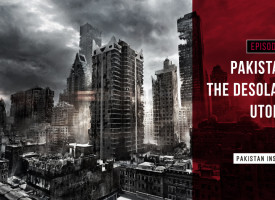Pakistan’s economy is a fairly unique one amongst other world economies, one where the idea of a receipt framework is either not strictly enforced or is completely overlooked. The Pakistani economy is generally cash-based and a huge part of it does not exist on the books, working as an alternate economy that does not contribute to tax revenue or follow regulations.
As indicated by a report published by Bloomberg BusinessWeek, on paper the Pakistani economy utilises more than 75 per cent of the country’s 54 million laborers, and contributes 50 per cent of Pakistan’s Rs 18 trillion ($200 billion) GDP. Below the radar, however, a cash-based economy flourishes with booming automobile sales and a strong real estate sector, for instance, regardless of the recently worsened security situation in the country.
Only 1.5 million individuals, just shy of 1 percent of the populace, files tax returns, as indicated by country’s Federal Board of Revenue. That contrasts sharply with India, where 3 percent of the people file tax returns. This difference is huge given that India’s population is more than 6 times that of Pakistan.
Alpha Luminaire CEO Mr Aman Bashir, who is actively involved in the real estate sector of Pakistan, says it would take a lot more than the recent security situations across the country to seriously upset the bigger picture of Pakistan’s economy.
“In both scenarios, whether it is the stock market crashing or the real estate sector undergoing correction, no long-term change should be expected because it takes a lot for investors to pull their money out of the stock market,” he says. “More difficult still to disrupt is the real estate market, which does not plummet in a day. It takes months and months of sustained political instability and social unrest to influence the real estate sector, and even these changes are swiftly reversed as soon as thing calm down. Frankly, regardless of Karachi’s security situation, the real estate market is not going to crash any time soon,” he adds.
Lahore is much calmer than Karachi, and has emerged in recent years as a stable business hub that relatively few political circumstances can impact. The stock market and the real estate sector of Lahore stood strong in the face of the instability that came in the wake of the Model Town incident on June 17, 2014 – when popular cleric Mr Tahir-ul-Qadri’s party offices were raided by police resulting in the loss of several lives.
This is a solid indication that across Pakistan, whether it is volatile Karachi or relatively calm Lahore, the general pattern of sale and purchase activity in the real estate sector remains uninfluenced and even the stock markets recover quickly if they feel a hit.
Mr Zeeshan Ali Khan, the CEO of Pakistan’s leading property portal Zameen.com, says the Model Town incident in Lahore did not affect the real estate business because property markets across the country have become virtually insusceptible to such security issues.
“Everyone is pretty much along for the ride now, and since investors are well aware that this sort of thing keeps happening every few months, the knee-jerk reactions have completely evaporated,” he adds.
According to data from Zameen.com, the price of 1-kanal plots in Karachi have kept their own pace going despite the security situation, which is a firm indication that the real estate market responds to its own set of variables instead of plummeting every time something goes wrong.
According to the figures from Zameen.com below, the security concerns in Model Town, Lahore also failed to dent the locality’s land prices, which continued their upward trend despite the events of June 9, 2014.
It is much-awaited good news for Pakistan that its property sector is steady and security breakdowns don’t have much of an effect.








No comments!
There are no comments yet, but you can be first to comment this article.